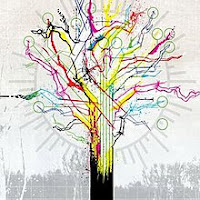Rosetta -- A Determinism of Morality

9/10
I reviewed Rosetta's A Determinism of Morality for this very blog six years ago. I'm not entirely happy with the writing in that review, so I'm glad it's popped up again for this series. Then again, I'm giving the album the same score, and still feeling the same difficulties in describing it.
Rosetta, upon their debut, were immediately tagged with the "post-metal" moniker. Using the descriptor "post" before listing a genre is a shorthand way of saying, it sounds like this band started off playing or listening to (insert genre) then got bored with it and started experimenting. Thus a rock band, or more likely, an aspiring rock band, bored with 3.5 minute songs and verse-chorus-verse structures, might start recording seven-minute long songs with no choruses, and voilà, you've got a "post-rock" band. Rosetta are metal in the way the guitars can get heavy and the drummer can start crushing his snare and smashing his cymbals, while the vocalist bellows like an angry bear, but "post" in that they're also likely to play spacey, beautiful, effect-laden guitar lines, as the drums jauntily tom-tom along. They also get the "post" tag because most of their songs are longer than six minutes--one gets all the way up to eleven. Yes, make a song longer than six minutes, and you're sure to be called "post" something. If a band with a singular sound like U2 started putting out albums full of chorus-less seven minute songs, would we call their genre "post-U2?
"What genre is Achtung, Baby?"
"It's post-U2!"
Unfortunately, calling music "post" anything doesn't really give you much of a feel for what it actually sounds like. A Determinism of Morality is an album full of feeling and emotion. From its first moment, the atmosphere blazes into focus, a vast nebula of sound, like the soundtrack to a last-hope-for-earth astronaut trying to repair an exterior antenna on his spacecraft while asteroids smash and stars nova all around him. It's the sounds of striving and fighting through intense waves of light and color. It's violent and it's beautiful, focused on the tragedy of ephemerality, containing a central lyric whose meaning has changed drastically for me in the last six years: "The problem with now is no matter how much we want it to, it doesn't last forever." My child was only an infant back then, I had tenuous employment, and my life felt like it could come apart any minute. Every good moment felt like it could be the last. Something that didn't occur to me then: "What if now sucks?" If indeed it does suck, then it not lasting forever isn't a problem at all. This is actually an optimistic way of looking at things. The central flaw to my entire way of thinking, which I have been aware of for well over a decade, is that I forget that life goes on. This isn't really a "life goes on" kind of album, though. It focuses on the crushing immediacy of the present. There's beauty in that, too.
A final comment: I really love Edgar Allan Poe's The Narrative of Arthur Gordon Pym of Nantucket. I think it is the single most underrated work of fiction in the English language. I have never read anything else that so effortlessly chronicles the evolution of a human psyche. The metaphysical mental journey the titular protagonist takes from start to finish should be dissected in literature classes across the Western world. Instead, the novel is merely relegated to a curiosity, the only work of long-form fiction the short story master, Poe, ever wrote. The novel's final passage finds Pym at the very end of the geographical Earth, in a sea of crashing boulders, and stops abruptly as Pym encounters an incomprehensible figure. I always thought this album would be a great soundtrack for that, as well. Space, sea, the edge of the Earth. All the same, I guess.

2010 Translation Loss
1. Ayil 4:59
2. Je N'en Connais Pas La Fin 6:49
3. Blue Day for Croatoa 6:37
4. Release 5:36
5. Revolve 6:43
6. Renew 6:09
7. A Determinism of Morality 10:51


Comments